

Anil Tanwar
Highly motivated, analytical and result-driven tax consultant having expertise in GST and E-Way Bill Compliance. Also, leading and managing all aspects such as implementation and functioning of GST process.
Double Entry System in Accounting and Bookkeeping. Introduction Accounting is an art of identifying, recording and summarizing the financial transactions that are measurable in terms of money and analyzing the result thereafter.
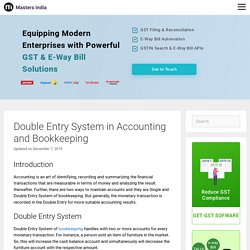
Further, there are two ways to maintain accounts and they are Single and Double Entry System of bookkeeping. But generally, the monetary transaction is recorded in the Double Entry for more suitable accounting results. Double Entry System Double Entry System of bookkeeping handles with two or more accounts for every monetary transaction. It’s a central idea enveloping accounting and bookkeeping in present occasions. Recording System Double entry system records the monetary transactions in terms of Credit and Debit item. Types of Accounts The accounting and bookkeeping process measures, records and imparts everyday monetary activities or transactions.
Personal AccountReal AccountNominal Account AssetsEquityLiabilitiesProfitsLossesExpenditureRevenues Debit and Credit Double Entry System Process Journal: Ledger: Classification of Negotiable Instruments. Nowadays negotiable instruments are probably the most widely recognized methods of carrying out a business transaction.
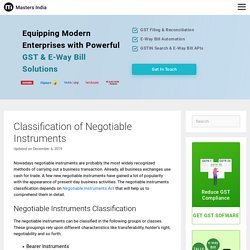
Already, all business exchanges use cash for trade. A few new negotiable instruments have gained a lot of popularity with the appearance of present-day business activities. The negotiable instruments classification depends on Negotiable Instruments Act that will help us to comprehend them in detail. Section 80TTB Deduction for Senior Citizens. With the increasing age, health issues arise and senior citizen suffers from both physical and mental issues.
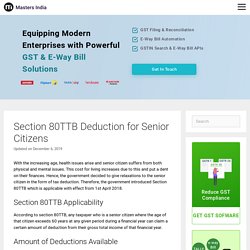
This cost for living increases due to this and put a dent on their finances. Hence, the government decided to give relaxations to the senior citizen in the form of tax deduction. Therefore, the government introduced Section 80TTB which is applicable with effect from 1st April 2018. Section 80TTB Applicability According to section 80TTB, any taxpayer who is a senior citizen where the age of that citizen exceeds 60 years at any given period during a financial year can claim a certain amount of deduction from their gross total income of that financial year. Some of the familiar examples of source documents. Source documents or source vouchers are the original records that are generated on each business transaction.
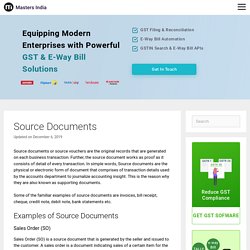
Further, the source document works as proof as it consists of detail of every transaction. In simple words, Source documents are the physical or electronic form of document that comprises of transaction details used by the accounts department to journalize accounting insight. This is the reason why they are also known as supporting documents. Some of the familiar examples of source documents are invoices, bill receipt, cheque, credit note, debit note, bank statements etc. Sales Order (SO) Sales Order (SO) is a source document that is generated by the seller and issued to the customer.
Check PF Balance online. Employee PF Scheme EPF scheme is the employee provident fund scheme which is the major scheme under the Provident Fund and Miscellaneous Provisions Act 1952 and is managed by the EPFO (Employee Provident Fund Organization).
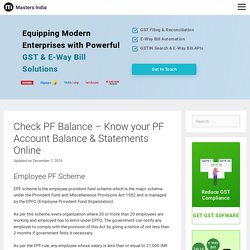
As per this scheme, every organization where 20 or more than 20 employees are working and employed has to enrol under EPFO. The government can notify any employer to comply with the provision of this Act by giving a notice of not less than 2 months if government finds it necessary. As per the EPF rule, any employee whose salary is less than or equal to 21,000 INR are covered under the EPF Scheme.
4 Major Accounting Conventions. Accounting conventions were established with a motive to bring uniformity in the books of accounts at the time of preparing them.
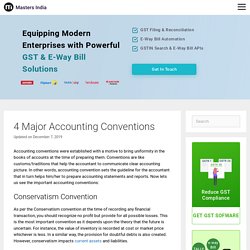
Conventions are like customs/traditions that help the accountant to communicate clear accounting picture. In other words, accounting convention sets the guideline for the accountant that in turn helps him/her to prepare accounting statements and reports. Now lets us see the important accounting conventions: Conservatism Convention As per the Conservatism convention at the time of recording any financial transaction, you should recognize no profit but provide for all possible losses.
Nowadays the conservatism convention is being criticized as it conflicts with full disclosure convention. Authorised Capital and Paid-up Share Capital. Every Company including OPC, Private, Public, LLP etc., regardless of size, type and category of business will have its share capital categorized under different financial statement types.
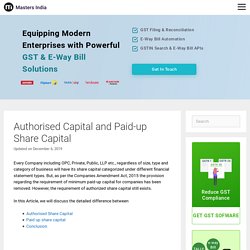
But, as per the Companies Amendment Act, 2015 the provision regarding the requirement of minimum paid-up capital for companies has been removed. However, the requirement of authorized share capital still exists. Authorised Share Capital. Benefits of Filing Income Tax Return. Any individual who is earning income from one source or other needs to file Income Tax Return (ITR) irrespective of the tax slab.
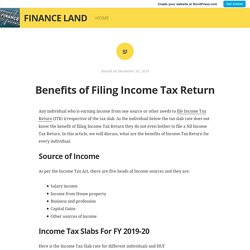
As the individual below the tax slab rate does not know the benefit of filing Income Tax Return they do not even bother to file a Nil Income Tax Return. In this article, we will discuss, what are the benefits of Income Tax Return for every individual. Source of Income As per the Income Tax Act, there are five heads of Income sources and they are: Salary incomeIncome from House propertyBusiness and professionCapital GainsOther sources of income. Section 194D TDS on Insurance Commission. Insurances help in many ways, one of the common benefits of having insurance is that it helps in meeting medical emergency finance.
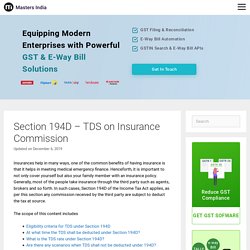
Henceforth, it is important to not only cover yourself but also your family member with an insurance policy. Generally, most of the people take insurance through the third party such as agents, brokers and so forth. New Simplified GST Return Filing. New GST Returns were introduced with a motive of simplifying the compliance process involved in the GST ecosystem.
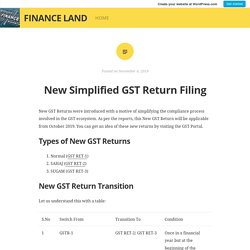
As per the reports, this New GST Return will be applicable from October 2019. Everything you should know about TCS. TCS (Tax Collected at Source) is a concept that is covered under both Income Tax Act and GST Act. TCS is collected by the seller from their buyer on the specified goods. The list of goods on which TCS is applicable is covered under Section 206C of the Income Tax Act. Let us understand the concept of TCS in brief. 1. All about ITC. What is ITC (Input Tax Credit)? To eliminate ‘tax on tax’, Input Tax Credit (ITC) component was introduced into the GST structure. The term ‘Input’ means any product that will be used by you for period of time but excludes capital goods. Deductions under Section 80RRB. Under the Income Tax Act, Section 80RRB was introduced to encourage innovation in India as it helps in safeguarding the interest of an individual on the patent that he owns. Let us understand Section 80RRB in brief. 1. GST Calculator in India.
GST Calculator is a tool through which a person can calculate the GST amount depending upon the intra-state and inter-state supply. To understand the working of the GST calculator we need to first need to know the basics about GST. In this article, we will discuss the GST Calculator from scratch. What is GST? GST is the short form of Goods and Services Tax that has subsumed all the other indirect taxes. It was introduced by the Government of India with a motive to simplify the indirect tax structure. Track ARN Status Check GST Registration. Application Reference Number (ARN) helps the applicant to track the GST Registration status till the time he/she gets the GST Registration Certificate and GSTIN. Let us understand the different steps involved in tracking the GST registration status using ARN through this article. 1.
Form GST RET-1. Frequently Asked Questions on GSTR9. Q.1. All about GSTR-3B. GSTR-3B is a return that has to file by every registered taxpayer. Every taxpayer needs to file this GSTR-3B until June 2019. Income Tax Return Filing. Many taxpayers find the income tax return filing procedure to be tedious and time taking. Permanent Retirement Account Number.
NPS (National Pension Scheme) was introduced by the government with the motive to encourage savings amongst the citizens so that when they retire they get a fixed amount of money regularly. Howsoever, for the NPS holder, it is compulsory to have PRAN (Permanent Retirement Account Number) so that they could see the saved amount in their Permanent Retirement Account (PRA). 1. E-Way Bill Login Portal Guide. A taxpayer who wants to generate, cancel or manage the eway bill can either have to log into ewaybillgst.gov.in system or ewaybill.nic.in system. However, ewaybill.nic.in gets redirected back to the ewaybillgst.gov.in when a taxpayer click on the e-way bill Login link as earlier eway bill portal was earlier maintained by NIC. So, ewaybillgst.gov.in is an official government that shall be used by the taxpayer or transporter to generate, cancel or manage e-way bill.
Now let us see what ewaybill.nic.in homepage looks like and what all tabs it contains So in the above screen shot we can see that ewaybill.nic.in Home page tab contains. GSTR 7 Return Filling. GST Login Portal Guide. GST Login Portal (www.gst.gov.in) is a platform through which an individual can perform various functions. GST Number Search by Name. Union Budget Key Highlights 2019 to 2020. India’s second union finance minister Mrs Nirmala Sitharaman on Friday presented the budget for 2019-2020. In her budget speech, Mrs Sitharaman said that the government will introduce an inter-operable ATM with the aim of one nation one card for travelling across India, make housing affordable by introducing new laws and make new interest subvention scheme for MSMEs and women.
Here are some major highlights that you must know about budget 2019. No E-Way Bill if GST Returns are Pending. GSTR-8 Form: Return filing, Due Date and Format. Income Tax Return Filing. ESIC Portal Login process applicability and services offered. Meaning of GSTIN, TAN, PAN, DSC and DIN. Income Tax e-Filing Portal Login & Registration Guide. GST on medicines and medical supplies in India. Changes in GST as per Union Budget 2019 to 2020. 5 things you should know about e-Invoicing under GST. Boost to Start-up India in Budget 2019-20.
Form CMP-08 Eligibility Criteria, Penalty and Format. Government GST Portal Login. GSTR 9C Form Filing Issues and Possible Solutions. 36th GST Council Meeting Agenda. File ITR-2 Form Online. 36th GST Council Meeting. File ITR-3 Form Online. ICEGATE : e-Commerce Portal of CBIC. Legal Name vs. Trade Name under GST. How to Pay GST Online. How GST Works in India. Form GST RET-1. FORM GST RET-1A. New GST Return Forms. GST ANX-1 Form. GST ANX-2 Inward Supplies Annexure. GST PMT-08 Form. GST RET-2 Form. Why is necessary to register on ICEGATE. 4 Ways to Deal with Late Invoice Payments. In this article we will discuss about e-sanchit faqs. 2 Years of GST (Goods and Services Tax) in India – Analytical Report. Brief History of GST. Enhancement in the E-Way Bill System. ICEGATE Portal. ICEGATE E-payment Process. We will be discuss about important aspects of Form 16. All about Bill of Entry (BOE)
What is Meaning of GST. Everything you ought to know about e-SANCHIT. E-AADHAAR Card Password. 37th GST Council Meeting. 37th GST Council Meeting Highlights. E-Way Bill Generation Process Automation. Gst Refund Application. Proposed e-Invoicing System. Sub Fields of Accounting. 92000 Crores of GST Collected in September-17. GST Rates on Restaurants to come down. GST Clouds Roving over Real Estate. Delhi Exceeds GST Target in October'17. Accounts Receivable - What is Accounts Receivable? What is Bookkeeping? Definition and Meaning. What is Bookkeeping? Definition and Meaning. 8 Bad Habits that May Impact Your Bookkeeping this Year. How to Link Aadhaar with PF Account Online or Offline. Guide for Filing the GST Form TRAN-2. An Introduction to Debit and Credit in Accounting. 5 Reasons Why Bookkeeping is Important. Non-Disclosure Agreement. TDS - What is TDS (Tax Deducted at Source) Loan Agreement. Accounting Ratios.
Accounting Ratios. 6 Habits of Bookkeeper that an Entrepreneur Should Follow. E Way Bill Shifting the Landscape for The Transport and Logistics Industry. Trial Balance - What is a Trial Balance? Shareholders Agreement. 7 Bad Invoicing Habits That You Must Break. Introduction to Depreciation. What are the Fundamental Accounting Assumptions? PPF Account - How to Open a PPF Account. What is a Voucher? Definition and Meaning. Transporter’s Role in The E-Way Bill System.